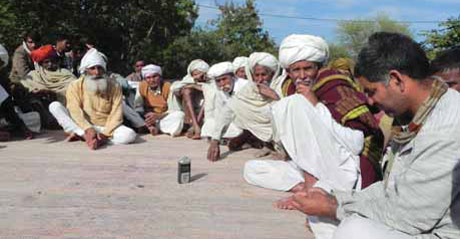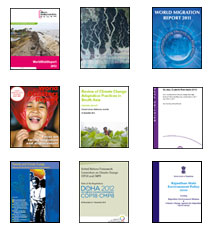

Members of the Arvari ‘Parliament’ enact rules to restore a river
By Bhavana Gurung
Elderly men in dhotis and pagdis are seated on a durrie in the dim winter sunlight. One by one, they step up to the centre of the group and speak. The meeting of the Arvari Sansad (parliament of the river Arvari) is taking place at the premises of Tarun Bharat Sangh (TBS), an NGO working towards rural development through the restoration of local ecology. Rajendra Singh, who heads the organisation, sits in a corner and listens quietly.

Photo: Showvik Das Tamal
Arvari Sansad beginnings
The Arvari Sansad is a unique regulatory body comprising represen tatives from 72 villages in and around the district of Alwar in Rajasthan that have a stake in the river
Arvari. In the 1980ʼs, the area witnessed a severe drought that almost dried up the river Arvari. In 1987, local communities in association with TBS started to construct rainwater harvesting structures in an attempt to address the problem. They used traditional engineering techniques of water management involving the construction of johads or small earthen dams to collect and store rainwater. By
1996, the nearly dead Arvari had been transformed into a thriving river, its deep pools stocked with fish.
When the government tried to auction fishing rights to outside contractors, locals objected vehemently. A public hearing in 1998, which attracted much media attention, led to the establishment
of the Arvari Sansad.
Kanhaiya Lal Gujjar, secretary of TBS says, “People worked hard to give life to the dead river, the dry, grey forests and a new life to themselves. But then a second party intervened. People
made the dams, they stored the water, they did everything to conserve nature. But when the government came to claim the benefits, we decided to form Arvari Sansad.”
By 1999, the Arvari Sansad had formulated its own rules to conserve and manage water and other natural resources (see box, below). The Sansad today consists of 250 members drawn from 72 villages in the Arvari basin, who meet twice a year, in addition to convening emergency hearings. A Coordination Committee observes the functioning in the villages.
The Arvari Sansad has helped revive six other rivers in Rajasthan, and has inspired other peoplesʼ campaigns, including the national water awareness campaign, save the rivers campaign,Tarun Jal Vidyapeeth (water university),and the Rashtriya Jal Biradari (water brotherhood), among others.
• The Arvari basin shall not have sugarcane, paddy & chilly. People growing these will be penalized.
• No one shall draw water from the river from Holi (March to April) up to the monsoon (July).
• Bore wells are not to be allowed in the Arvari catchments.
• The recommended crops are barley, makka, bajra in the upper reaches and vegetables in the lower reaches of the river.
• No axe can be carried to Bhairodev people's sanctuary, which is the catchment of the source of Arvari River.
• Fishing in the Arvari can be done only for food.
• Large-scale trade of food grains and vegetables is banned. Local production and consumption are to be emphasized.
• Village people are to help people from other areas for implementing water harvesting structures.
• Cattle outside the region are not permitted for grazing.
• Rotational grazing is to be followed by farmers in their own pasturelands.
• Industrial units are prohibited within 450 sq km of the Arvari basin.
The 29th session
The 29th session of Arvari Sansad was held on December 28 at the premises of Tarun Bharat Sangh in village Bhikampura, about 80 kms from Alwar. Representatives from 72 villages that have a stake in the Arvari river attended the meeting.
■ Sansad members reported how certain farmers in the Arvari basin were over drawing water, such as over aterig their wheat crops. They agreed that greater control and monitoring of their water supply was required.
■ Some members reported the incidence of logging and illegal mining in areas around the Arvari river, which could potentially affect water quality. The Sansad agreed to encourage villagers not to cut down trees in the area.
■ Some pointed the silt load going up in the Arvari caused by the breaching of the Government-built dam at Hamirpur after the first rains this year. members decided to petition the government to carry out the desilting of the Arvari, and to ensure proper reconstruction of the dam.



